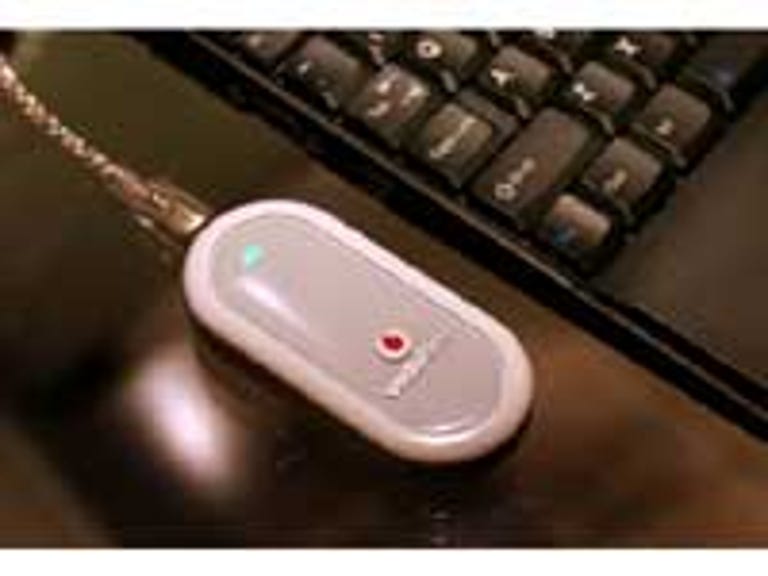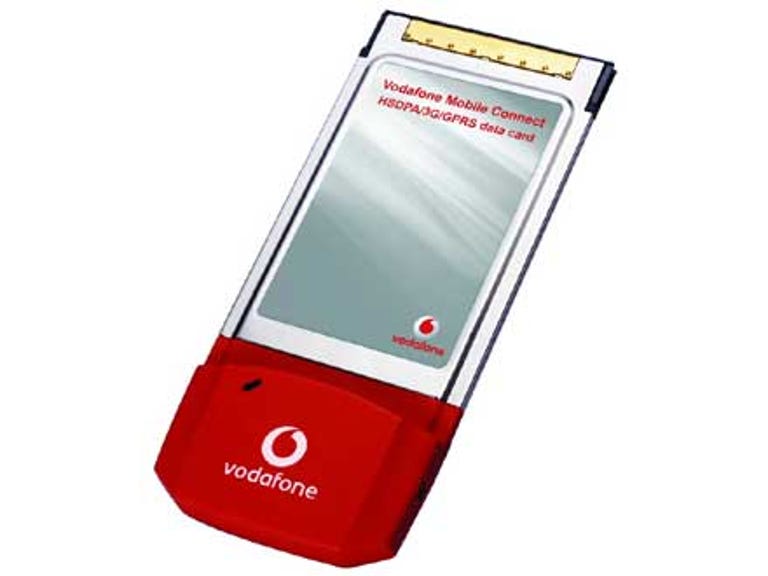 Why You Can Trust CNET
Why You Can Trust CNET Vodafone Mobile Connect 3G HSDPA Card review: Vodafone Mobile Connect 3G HSDPA Card
Vodafone's enhanced notebook PC Card delivers what the mobile telco calls 'business class 3G broadband' — but until more of the 3G network is upgraded with HSDPA, most users will remain stuck in economy seats.
From its early GSM-powered Vodafone Mobile Card (VMC) to the popular 3G version, Vodafone has long enjoyed poll position in the mobile data stakes. In October, it became Australia's first mobile carrier to introduce the speed-boosting HSDPA (High Speed Download Packet Access) technology onto its 3G network.
The Good
The Bad
The Bottom Line
HSDPA introduces a dedicated high-speed download channel to the 3G bandplan which, when partnered with some technical trickery at the cellular base station, amps up the data rate from 3G's rarely-obtained 384Kbps to a redline of 1.8Mbps. Actual download speeds range from 600Kbps to 1.4Mbps.
Design
There's a small socket for connecting an external antenna, although Vodafone no longer bundles the little 'paddle pop stick' antenna which came with the 3G version.

The VMC still uses the standard PC Card format, so while it supports Windows 2000 and XP along with Apple's Mac OS X, anyone whose laptop has only an ExpressCard slot will need to dig around for an extra $100 to get Vodafone's compact HSDPA USB modem.
Features
While you can disable compression of files sent through your VMC card, there's no way to prevent incoming data compression, which some Web developers have reported as an issue when working on the road.
As with previous Vodafone Mobile Connect cards, we were impressed by the card's software. With SMS and MMS messaging, address book management, connection profiles and a graphical summary of account usage, the console is easily the best client we've seen for any mobile data card.
Performance
Although Vodafone's 3G service covers most capital cities (Sydney, Melbourne, Canberra, Brisbane and the Gold Coast, Adelaide and Perth), HSDPA or '3G broadband' currently spans only 45% of the total network footprint.
At the time of writing its limited to what Vodafone terms "inner metro" coverage of Sydney and Melbourne. This will improve over the coming six months as more base stations in these and other capital cities are upgraded to HSDPA.
Outside those areas, the VMC signal falls back to standard 3G and, in the wost case scenario, the painfully slow data stream of GSM.
We tested the new VMC in the same locations used to trial Telstra's Next G wireless broadband card: the North Sydney CBD, in the middle of the city (specifically, in the Sydney Hilton Hotel's business centre) and Bondi Beach.
The first location met our expectations — after all, it's where Vodafone first conducted their own customer trials of HSDPA. The card took a swift 15 seconds to fire up and lock onto the network (substantially faster than the plain vanilla 3G model), averaged around 950Kbps — about halfway between Vodafone's own quoted figures of 600-1400Kbps — and peaked at 1.1Mbps. This was almost over four times what we experienced with the 3G VMC in the same location.
In the bowels of the Hilton Hotel business centre it was a different story. The VMC struggled to lock onto the HSDPA signal, with the client software showing constant toggling between '3G' and '3G+' networks (the latter being how it refers to HSDPA, and a far catchier moniker which we wish the carriers would adopt). Even the 3G signal strength was sufficiently weak that connections were either snails' pace slow or completely stalled.
At Bondi Beach, where even Telstra's Next G card struggled, the VMC was a non-starter.
Considering that Bondi Beach and the inner city are well within the boundaries of Vodafone's HSDPA coverage maps, this only underscores the importance of trialling every available wireless broadband solution before settling on one (or any).
Vodafone is offering its existing VMC customers a $70 rebate on the cost of the HSDPA card, bringing its price down to $229; it can also be purchased on a 24 month plan for $12.46 per month.
The plans are well designed and carefully structured: $29.95 per month for 100MB of data (both downloads and uploads are counted), $49.95 for 300MB and $99.95 for 1GB. Excess usage is charged at 30c/MB.
Until the end of December, Vodafone is running a promotion which gives two free months of usage for new VMC customers who sign up to the $100/month scheme.

